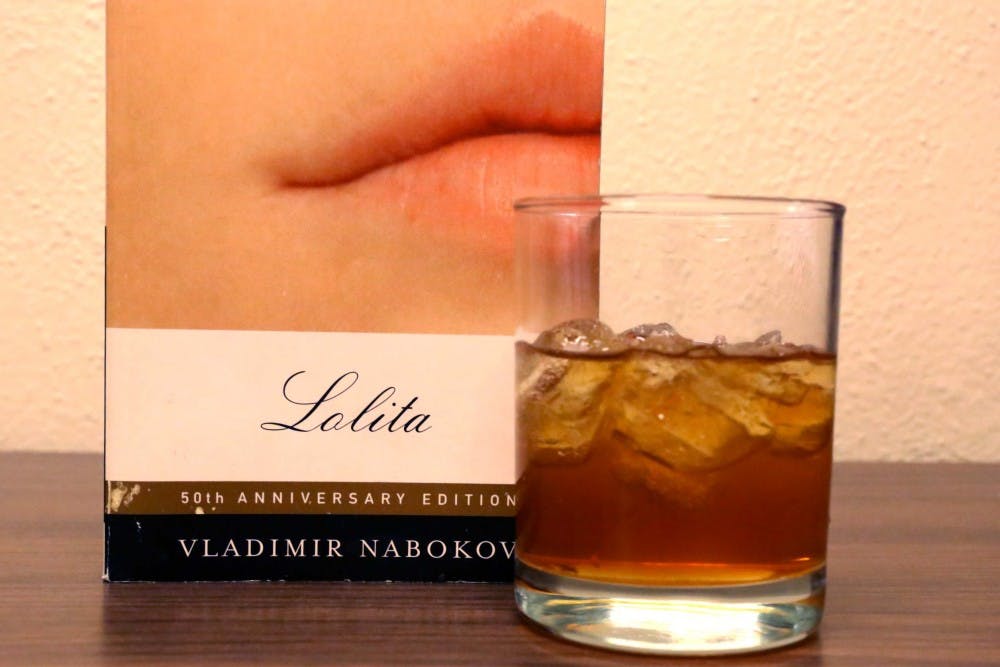Each week reporter Carson Abernethy drinks his way through great works of literature, reviewing books and the booze that inspired them.
"Lolita," like many novels of its time, was as controversial as it was brilliant. It was banned by some and heralded by others. The novel recounts the tragic relationship between middle-aged Humbert Humbert and 12-year-old Dolores, who Humbert nicknames "Lolita." Humbert serves as the unreliable narrator, attempting to justify the deplorable actions of the novel, such as murder, pedophilia, rape, incest, by casting himself as victim and Lolita as the seducer.
Vladimir Nabokov was a Russian writer who originally wrote novels in his native language, but his literary legacy was cemented by the works he later wrote in English: "Pale Fire," "Ada," "Speak, Memory" and "Lolita." Nabokov was one of the greatest writers of the 20th century whose imagination expanded beyond literature to diverse subjects like chess, politics and the study of insects and butterflies.
The Amaretto Sour is a cocktail that is both sweet and sour, one that you might imagine Lolita would be drawn to — easy going down, but refined, reflecting both the sweetness of childhood and the sourness of childhood innocence being corrupted. It also reflects the dualities and dichotomies present in the book: high-brow and low-brow, good and evil, sweet and sour.
Recipe:
3 oz. amaretto
1 1/2 oz. sweet and sour mix or lemon juice
Combine ingredients and shake over ice. Strain into a glass filled with ice.
Prose: 5/5
Nabokov had a masterful grasp of language, and "Lolita" is replete with puns, double entendres, anagrams and other word play. It is rare to see a book as erudite as this that is still beautifully written and easy to read. The cadence of his sentences is masterful, almost musical, as in the opening sentences, "Lolita, light of my life, fire of my loins. My sin, my soul. Lo-lee-ta: the tip of the tongue taking a trip of three steps down the palate to tap, at three, on the teeth. Lo. Lee. Ta."
Characterization: 4.5/5
"Lolita" contains two of the most famous characters in literature with Humbert Humbert and Lolita herself. Both are tragic, complex characters, both each other's doom. Humbert is a murderer, rapist and pedophile, but he still elicits near pity from the reader. His account of events is convincing to some — there are a minority of commentators who take his side, arguing it was he who was corrupted by Lolita, not the opposite. Lolita herself suffers a tragic fate like Humbert's, but hers is not of her own doing. One of the brilliant bits of characterization with regard to Lolita is the dichotomy between how Humbert sees her — as an object of worship, a nymphet — and who she really is — unexceptional and ordinary.
Cohesiveness: 4/5
The novel has a fairly straightforward structure, and varying the lengths of chapters is an effective technique. One of the interesting things about the novel in terms of cohesiveness is its metafictional quality; it is revealed that the novel is Humbert's memoir, only to be published in the event of both his and Lolita's death. Humbert dies after publishing the manuscript, and Lolita shortly after. This framing device is a really interesting way to give the ramblings of an insane person cohesion.
Relevance: 4/5
"Lolita" itself is not as applicable to modern times as the character of Lolita, who has entered the public consciousness forevermore. While the common conception of Lolita as a sexually promiscuous beauty is less rooted in the novel (Lolita is quite plain and gangly, even unladylike), it is readily apparent in modern society with shows like "Toddlers & Tiaras" and the cultural desire to sexualize young girls. Lolita has become a benchmark rather than the problem.
Overall: 4.5/5
"Lolita" is beautiful and tragic, the perverse fantasy of a troubled man whose obsessions destroy him and all those around him. It is probably the greatest novel since World War II, and one with enduring cultural appeal. Lolita is America's sweetheart it doesn't want you to know about.
Related links:
Books & Booze: 'The Sun Also Rises' by Ernest Hemingway
Books & Booze: 'The Great Gatsby' by F. Scott Fitzgerald
Reach the reporter at cabernet@asu.edu or follow @carson_ab on Twitter.
Like The State Press on Facebook and follow @statepress on Twitter.




